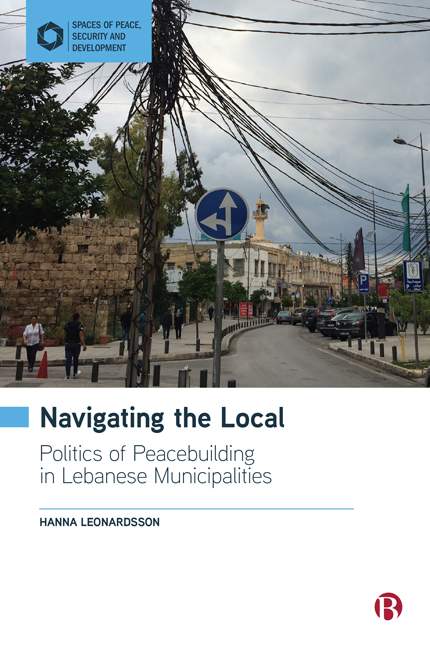Book contents
- Frontmatter
- Contents
- Acknowledgements
- Introduction
- 1 Theorizing Local Peacebuilding
- 2 Lebanese Municipalities, Centralized Peacebuilding and Possibilities for Change
- 3 Service Delivery: Providing for Local Needs
- 4 Local Interactions: Formal and Informal Everyday Interactions
- 5 Vertical Relationships: Connecting the Local to the National and Global
- Conclusion
- References
- Index
5 - Vertical Relationships: Connecting the Local to the National and Global
Published online by Cambridge University Press: 17 January 2024
- Frontmatter
- Contents
- Acknowledgements
- Introduction
- 1 Theorizing Local Peacebuilding
- 2 Lebanese Municipalities, Centralized Peacebuilding and Possibilities for Change
- 3 Service Delivery: Providing for Local Needs
- 4 Local Interactions: Formal and Informal Everyday Interactions
- 5 Vertical Relationships: Connecting the Local to the National and Global
- Conclusion
- References
- Index
Summary
This chapter discusses vertical interconnectedness as initiated by Lederach (1997), emphasizing a multi-level approach in peacebuilding that connects actors and actions on the local level with those on the national and international, and vice versa. The idea of vertical relationships argues that relationships matter for local developments, enabling peacebuilding activities that, in turn, mitigate conflict. The notion of vertical relationships as a peacebuilding function highlights complementarity, autonomy and agency. Briefly, complementarity emphasizes local, national and international actors working towards the same goals, aligning interests and adapting activities to local needs (Mitchell and Hancock, 2012, p 175). Autonomy is coupled with vertical relationships, highlighting that the more autonomous a local space is, the less vertical relationships matter for local developments, and vice versa (Brinkerhoff, 2011; Kälin, 2004). Finally, agency emphasizes the need for vertical relationships as a peacebuilding function to allow local actors to define and redefine what local peacebuilding means in the local space. Agency acknowledges power asymmetries between local and national or international actors, while opening our eyes to the ways they are challenged and used by local actors.
This chapter discusses vertical relationships between the municipality of Tyre, Bourj Hammoud and Saida and central state authorities, national political figures and international actors. Throughout the chapter, municipal councillors, employees and civil society actors provide their reflections on how vertical relationships work for local developments and, over time, give local governments a role in local peacebuilding. Vertical relationships in Tyre, Bourj Hammoud and Saida are discussed in the light of vertical relationships within Lebanese multi-level governance, and illustrated by local developments such as infrastructural developments and waste management. By doing so, the chapter sheds light on how vertical relationships matter for developments on the ground, highlighting the diversity in vertical relationships and what implications it has for understanding local government engagement in building local peace.
Tyre
In Tyre, as in Lebanon as a whole, vertical relationships between the municipality and the central state are influenced by the administrative structures and a high degree of centralized authority. This was explained by municipal councillors as normal and a relationship based on routine. As one municipal councillor described it:
‘the municipality is a small government, so it is a typical Lebanese government. They [the municipality] can do some actions, but also they have to refer to the higher level of authority.’ (Int. 2, municipal councillor, May 2015)
- Type
- Chapter
- Information
- Navigating the LocalPolitics of Peacebuilding in Lebanese Municipalities, pp. 108 - 133Publisher: Bristol University PressPrint publication year: 2023



